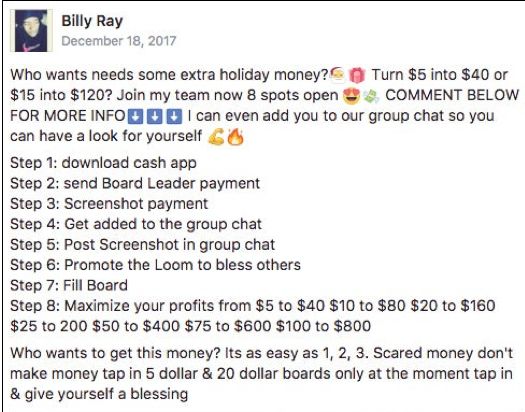It seems the internet will never be completely free of scams, fake ads, and outlandish claims by companies and the products they sell. And 2019 is proving to be no different. Here’s the latest on what to look out for when browsing the web, scrolling your Facebook news feed, and clicking on those enticing ads.
1) Although Facebook has pledged to get tough on scammers, millions of users are still being targeted by fraudsters. Harry Rose, editor of Which? magazine, said: “Facebook has promised to tackle scams head-on so we’re disappointed that it took them a full 24 hours to remove our falsified ad, despite many comments flagging that it was fake.” Facebook and other tech companies urgently need to put systems in place to ensure their millions of users are protected from scams that could see them conned out of substantial sums.” A Facebook spokesman said: “We are taking action to stop fraud wherever it appears, and will continue to adapt to the increasingly sophisticated techniques fraudsters use to con people.
Just remember the old adage, if it seems too good to be true it probably is. And follow these rules:
• If an ad is endorsed by a celebrity, do not assume it is genuine.
• Never use a financial service advertised on social media without checking their background.
• Avoid filling out quizzes or surveys that ask you for personal details. They could be used to commit ID fraud, or target you with follow-up scams.
• Do not click, like or share posts you are unsure of. Opening links or downloading attachments could risk installing a virus on your computer.
• Be wary of unusual messages from friends if they contain links to “too good-to-be-true” offers or ask for money – even if the message has been sent via Facebook Messenger. A change in your friend’s style of writing is also a likely sign that it’s not them. Always contact your friend privately to check.
• Check your privacy settings and limit what is publicly visible. Facebook sets your friends list to “public” by default. So if a scammer creates a convincing copy of your account, it’s easier for them to target people on your friends list. Use Facebook’s privacy settings to change it to private or “friends only” instead.
• If you spot a suspicious post on Facebook, report it. Click on the three dots in the top right hand corner of the post and select “Give feedback”.

2) Because Millennials are constantly on social media, it provides the perfect scenario for scammers and fraudulent activity. Recently, Better Business Bureau Northwest + Pacific has seen a rise of scam activity occurring on Snapchat. The scheme targets young adults with an offer to make money through a “sponsorship” or “advertising opportunity.” They instruct the person to send money via gift cards to pay for “advertising” and then scammers request account login information to get on Snapchat and invite that person’s friends to be part of this “opportunity” and keep the scheme going. The victim’s login information is changed so they cannot login to stop it or warn others, leaving the scammer in control of the account until Snapchat is notified.
BBB has already identified these types of scams happening in Texas, Louisiana, South Carolina and New York. Recently the Police Department in Boise, Idaho reported seeing it as well, with a local victim losing thousands of dollars. Because 71% of Snapchat users are between ages 18-29, it’s easy to see why so many young consumers might fall for it.
Anytime someone asks for your login information and/or payment via gift card, it’s a scam. Block that user, delete the message, and report them.
3) The last scam targets users on the other end of the age spectrum. The “Grandparent Scam” has been around for years, but variations keep popping and duping thousands of consumers every year. In 2018, an estimated $1.48 billion was reported stolen, with those over the age of 70 suffering the highest average losses, according to the Federal Trade Commission.
Typically, the victim receives a frantic phone call from a scammer posing as a grandchild or other family member. The “grandchild” explains that he or she is in some kind of trouble and needs help. The “grandchild” pleads to not to tell his or her parents and asks that they wire thousands of dollars for reasons such as posting bail, repairing a car, covering lawyer’s fees or even paying hospital bills. The caller is counting on an instant reaction from the victim by playing the sympathy card.
What you need to do first is verify the caller. Ask a personal question that only your grandchild or family member would know the answer to. Tell them you’ll call back and ask for a number; then contact your grandchild or another family member to determine whether or not the call is legitimate and confirm the whereabouts of the grandchild.
Never send money through wire transfer or other “sketchy” methods, especially to locations overseas. That is a serious red flag. Scammers also commonly use payment via prepaid card or gift cards.
If you do fall victim to the “Grandparent Scam”, report the incident immediately to the BBB Scam Tracker and local police.
